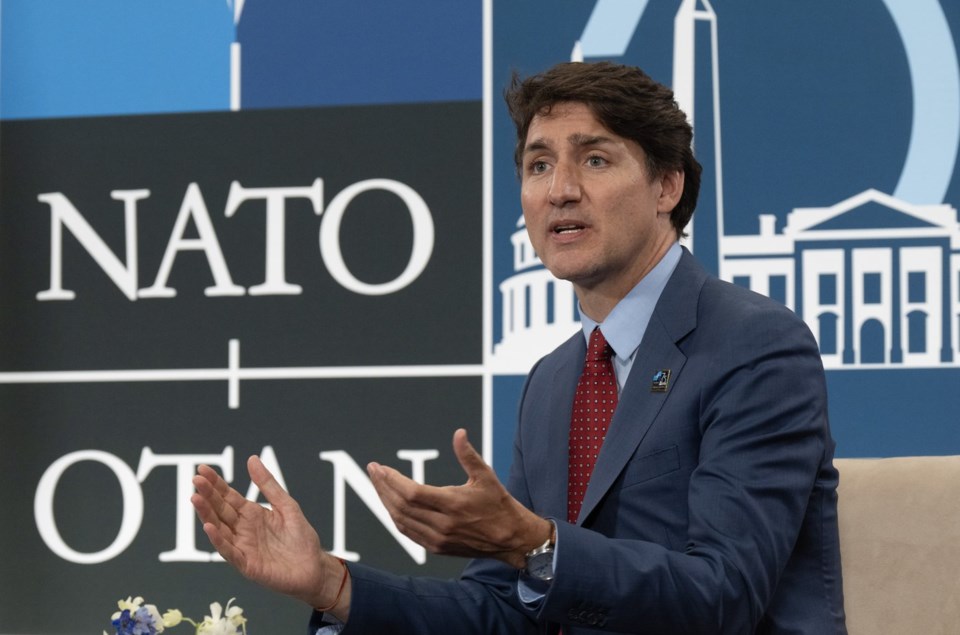WASHINGTON, D.C. — Prime Minister Justin Trudeau says Canada "fully expects" to hit NATO's defence spending target in 2032.
The newly announced timeline came after days of pressure from other countries as NATO's three-day annual leaders' summit wrapped up in Washington, D.C., on Thursday.
But the government provided no new details about how Canada will make it happen.
"We have shown that a responsible government steps up in a changing world and does the necessary work not just to increase defence spending, but to do it in the right way," Trudeau said at a press conference.
The 32 members of the alliance have agreed to spend at least the equivalent of two per cent of national gross domestic product on defence.
While Canada has increased its defence spending by 57 per cent since 2014, it still lags behind other NATO allies.
Current spending sits near 1.37 per cent of GDP. An updated defence policy from April estimated it would grow to 1.76 per cent by 2030.
Allies have pushed Trudeau to produce a roadmap for how the country will hit two per cent spending. He arrived at the G7 meeting as the lone NATO leader without such a plan.
It remains unclear how much more money will be allocated to national defence in the next eight years or how that will fit within the Liberals' fiscal plans. This year's federal budget only projects the GDP through 2028, and the government did not provide an estimate of the outlook for 2032.
The new date is unlikely to quell the criticism, said Aaron Ettinger, a politics professor at Carleton University in Ottawa.
"(It) doesn’t fill me with a great deal of confidence that it's actually going to happen," Ettinger said.
"That is so far in the future and all the pressing problems are right now."
The issue has taken on particular importance with Donald Trump running for re-election in the U.S.
The former president has been vocal about so-called freeloading allies who aren't spending enough, saying at one point that he would encourage Russia to do whatever it wants to those countries, and musing about pulling out of NATO altogether.
Trudeau has tried to deflect criticism, saying the Liberal government has been drastically increasing the defence budget since it came to power. He repeated that point Thursday, citing spending pledges that amount to $175 billion over the last eight years.
Canada's defence budget is estimated at $29.9 billion for this year. Only the U.S., United Kingdom, France, Germany, Italy, Poland and Turkey spend more in terms of real dollars.
Twenty-three of the 32 NATO allies are expected to meet the two per cent target this year.
Meeting the benchmark would send "a signal to the United States that we are reliable" as a defensive and economic partner, Ettinger said.
Still, Thursday's development was positively received by David Cohen, the U.S. ambassador to Canada, who said it "marks an important positive step toward meeting our shared goals."
Disapproval from the official Opposition in Ottawa was immediate, with Conservative defence critic James Bezan accusing Trudeau of producing the date to "save face" at the summit.
"If this commitment to get to two per cent was serious, it would have been included in (the April defence policy update)," Bezan said in a statement.
Bezan didn't confirm if a Conservative government would meet the target, but said the party would "make real and credible efforts to work towards meeting our NATO spending commitments."
Lindsay Mathyssen, the defence critic for the NDP, asserted that the new commitment mustn't come at the expense of other priorities.
"Announcing more spending to reach an arbitrary target without a strong plan to fix the procurement process isn't a solution," she said. "This sounds more like a recipe to make rich private consultants richer on Canadians' dime."
Defence Minister Bill Blair said the 2032 timeline is "in line with commitments by several allies who have made comparable pledges." When asked for details about the actual spending commitment, Blair's office referred questions to the Defence Department, which did not immediately respond.
Blair's office noted that the updated defence policy includes a list of 10 capabilities that Canada wanted to acquire. To reach the 2032 target, the statement said "Canada will invest in the right mix of these additional capabilities ... on the right timeline." No cost estimates were attached.
Trudeau and Blair announced this week that Canada is beginning the procurement process for one of those capabilities, with an aim to buy up to 12 conventionally powered submarines that can operate under ice.
Blair has long cited the new submarine fleet as a key component to meeting the spending target, but the government has not said how much the subs could cost or how long they will take to build.
When pushed on Canada's defence spending delays, Trudeau turned to a familiar talking point: that the NATO spending formula is arbitrary and doesn't provide a full picture of a country's contributions to the alliance.
"We continually step up and punch above our weight, something that isn't always reflected in the crass, mathematical calculation that some people turn to very quickly, which is why we've always questioned the two per cent as the be all and end all of evaluating contributions to NATO," he said.
This report by The Canadian Press was first published July 11, 2024.
— With files from Sarah Ritchie in Ottawa.
Kelly Geraldine Malone, The Canadian Press



